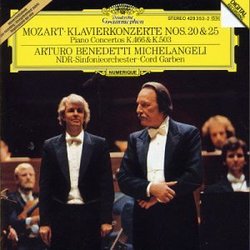| All Artists: Mozart, Michelangeli, Garben Title: Piano Concerti 20 & 25 Members Wishing: 1 Total Copies: 0 Label: Dg Imports Original Release Date: 1/1/1989 Re-Release Date: 11/13/1989 Album Type: Import Genre: Classical Style: Number of Discs: 1 SwapaCD Credits: 1 UPC: 028942935327 |
Search - Mozart, Michelangeli, Garben :: Piano Concerti 20 & 25
 | Mozart, Michelangeli, Garben Piano Concerti 20 & 25 Genre: Classical
|
Larger Image |
CD Details |
CD ReviewsFINALE DAVID BRYSON | Glossop Derbyshire England | 07/27/2003 (4 out of 5 stars) "Michelangeli made this disc in 1989 after being taken ill in the previous year. At his last London recital in 1990 he looked a sick man and we should be thankful that he lived long enough to fulfil, at least partly, his intention to do more Mozart. In the C major K503, which has one of the greatest and grandest first movements that Mozart ever turned out in any instrumental form, Michelangeli is very 'mainstream'. The layout of the solo part gives limited scope for the very special Michelangeli sound, and his tempi are pure textbook tempi, with no hint of adagio in the Andante slow movement and no hint of allegro in the Allegretto finale. I am supposing that the Allegretto marking is authentic -- my Eulenburg score puts it in brackets, but the editor makes no comment and none of the commentators on the 3 performances I own suggest any doubt on the matter, which I mention mainly because Katchen's speed is allegro and no two ways about it. I find it very effective indeed, but if Mozart said allegretto then that is how it ought to go. Serkin pulls off the nice trick of borderline speeds in both movements. A firm recommendation is difficult even with only three in the frame. Katchen died young and this is a young man's performance that I particularly like, allegro finale and adagio slow movement notwithstanding. Serkin's reading is from his late complete set with Abbado and the LSO. These have had mixed notices, but the thing about them for me is that that they are, consciously and explicitly, an old man's interpretations. Seen from a distance, Serkin at 80 looked an exceptionally fit 60, and although in his playing he rarely tried to reproduce the very special electricity that made him so unique in his prime, the absolute evenness of his touch is very striking (you could not say that about Horowitz) and there is a sense of dreaming about the first movement, taken at a deliberate speed. With Michelangeli, not yet 70, I sense the newcomer. There's nothing to criticise in his performance, but if you are looking for something special I doubt you will think you have found it here.In the D minor there is a welcome appearance by that rare visitor to the Mozart repertory, Richter. Mozart was not his favourite composer (he said so) and he is very straightforward here. The playing is as accomplished as you would expect and the self-communing introversion is absent, which I regret. It's an aspect of his style that I like very selectively. I could have done without it in a good number of other pieces, but I feel it might have played very well indeed in this one. Katchen is excellent again, very mouvemente in all 3 movements and scaling down his touch admirably. With Michelangeli I don't know how his special tone-quality will impact on you here -- I honestly can't make up my mind even for myself about this. If you know his playing, you will know the very individual kind of sound that I am talking about, and there is more scope for it in this concerto than in the other. I would find the issue easier if I got any special sense of insight or revelation from him but really I don't and I don't feel I'm going to either. From my point of view as a Michelangeli-collector it is intrinsically of interest. From my point of view as an awestruck listener to one of Mozart's deepest and most menacing compositions I know that the real sense of awe is generated by Serkin/Szell. This is Serkin in his prime this time. He scales down his touch more than any of them, and there is a sense of suppressed fires smouldering below the ever-lordly, ever-Augustan surface of the first movement. He and Szell had been friends since boyhood and it shows here in the complete empathy of this totally remarkable reading. The slow movement still has shadows over and behind it, and something breaks the surface in the finale that verges on the frightening after listening to the other three. Michelangeli was, I suspect, the greatest piano executant who ever was but he comes nowhere near insight like this. There is another recording by him of the D minor with Giulini in 1951 which you may find of interest as I did despite some very tulgy recorded sound. At least in this performance he gives us Beethoven's cadenzas, not whatever the things were he used in 1951."
|

 Track Listings (9) - Disc #1
Track Listings (9) - Disc #1